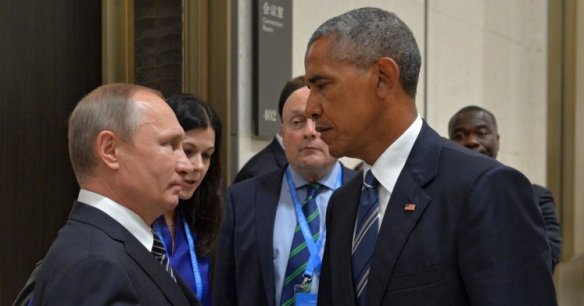
Obama and Putin found little joy in the meeting in Hangzhou
The agreement on managing the Syrian civil war, reached between the United States and Russia in Geneva in the early hours of Saturday, September 10, was both surprising and pre-determined. US Secretary of State John Kerry had invested so much effort in the endless rounds of marathon talks with Russian Foreign Minister Sergei Lavrov that the absence of a deal would have amounted to a personal failure. US President Barack Obama, who met with Russian President Vladimir Putin a week ago in Hangzhou, China, for the G20 summit (September 4–5), was far from enthusiastic about the prospects for such a deal (Kommersant, September 5). And in his recent remarks at Oxford University, US Defense Secretary Ashton Carter was even more skeptical about Russian readiness to curtail support for Syrian President Bashar al-Assad (Newsru.com, September 7). Yet, Lavrov radiated satisfaction with this past weekend’s compromise and supplied tired journalists with vodka to toast it, while expressing confidence that al-Assad’s forces would observe the agreed ceasefire (TASS, September 10).
The new Geneva deal stipulates no limitations on al-Assad’s grasp on power, even though most Western and regional stake-holders in this devastating war have demanded that the Syrian leader be forced to step down—a condition rejected by Moscow (Lenta.ru, September 7). Meanwhile, the motley pro-Assad forces are not really aiming to capture besieged Aleppo, but have successfully turned this battle into a pressure point for the US and Western powers, who are appalled by the scale of this protracted humanitarian catastrophe (Kommersant-Vlast, August 29). Though seemingly unconcerned about civilian casualties, Russia finds it opportune to play on these US concerns in order to push for excluding from the ceasefire not only the Islamic State (IS—a.k.a. Daesh) but also Jabhat Fateh al-Sham (formerly known as al-Nusra Front) and other rebel groupings, which Moscow defines as terrorist organizations (Nezavisimaya Gazeta, September 8). Indeed, this proposition has been formalized in the Kerry-Lavrov deal: after a week-long pause in hostilities, the US and Russia agreed to create a joint military center for distinguishing between moderate opposition forces and terrorist groupings, which would be targeted by coordinated air strikes (RBC, September 10).
Russia has compiled a long list of such terrorist forces that includes just about every Syrian opposition group. But for the US, this separation of “rebels” from “terrorists” is an absolutely hopeless task, which is further aggravated by the ongoing Turkish intervention. In Hangzhou, Obama discussed with Turkish President Recep Tayyip Erdoğan plans for joint operations against the Islamic State (Nezavisimaya Gazeta, September 9). However, these plans are severely undermined by the fact that for Turkey, the People’s Protection Forces (YPG) of the Syrian Kurds are most certainly a terrorist organization, while the US considers this group a valuable ally (Polit.ru, September 9). Russia officially expressed “serious concerns” about the Turkish intervention, emphasizing the violation of Syria’s sovereignty and a threat to its territorial integrity (Mid.ru, September 7). Nonetheless, Putin also reassured Erdoğan that he has few objections to Turkey’s direct involvement—in fact adding pressure on Washington to make a deal with Russia because a ceasefire around Aleppo was a precondition for a Turkish offensive on the IS stronghold in al-Raqqah (RBC, September 6).
The rest of the article is in Eurasia Daily Monitor, September 12.